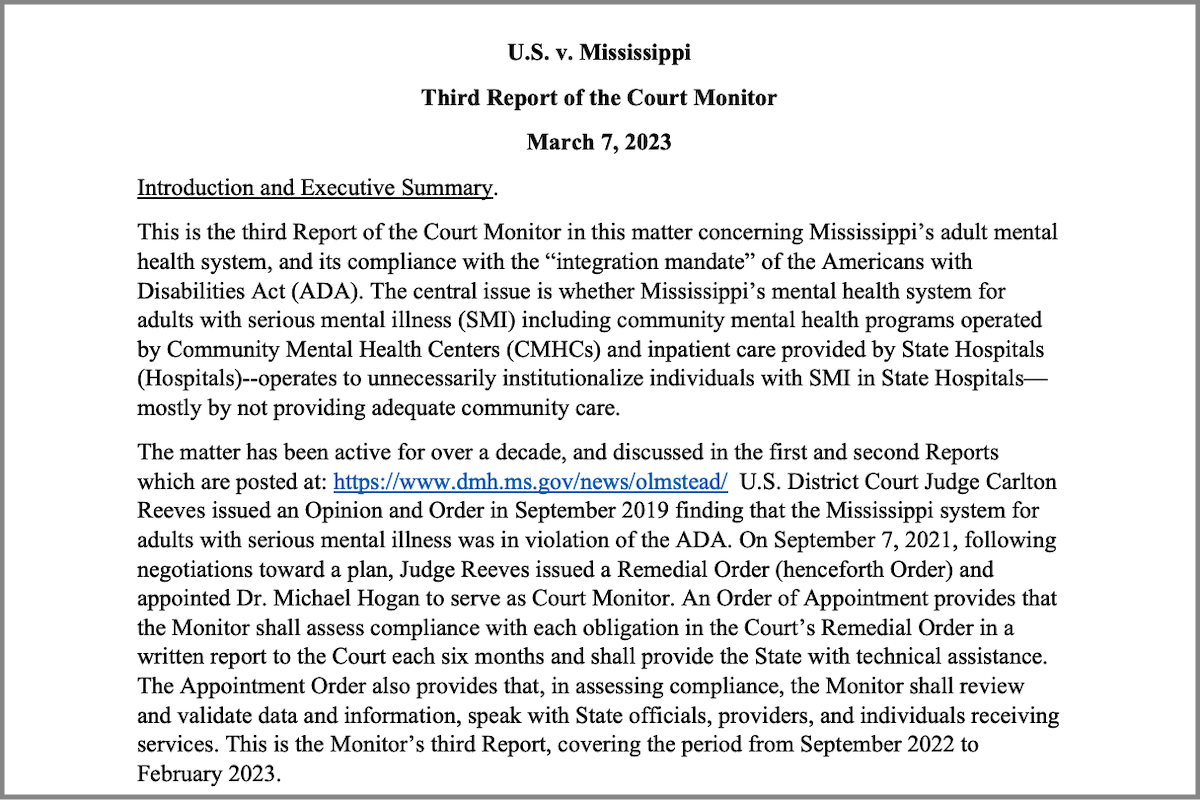In 2019, after a four-week trial, Judge Carlton Reeves ruled that Mississippi’s mental health system violates the Americans with Disabilities Act (ADA) because adults with mental illness end up segregated in facilities due to not having the support they need. Judge Reeves then imposed a remedy on the state mental health system, a set of conditions the system must meet to comply with the ADA. He appointed Dr. Michael Hogan to monitor the State’s implementation of the remedy.
The heart of this lawsuit is this: Does Mississippi’s mental health system provide the right kind of help so that people with serious mental illnesses can live in the community if they want to? Although the lawsuit is about adults, this question is relevant to anyone affected by serious mental health challenges, including children.
The remedy primarily requires the state mental health system to fund and make available services already in the Department of Mental Health’s Operational Standards. Dr. Hogan and his team monitor the State on 28 provisions in the remedy. Four of those are “stayed” or “partially stayed,” two have been “met” (the State has adopted core standards and appointed a monitor), and some are covered in other paragraphs.
According to Dr. Hogan’s report (page 7), “the monitor assesses compliance for each Requirement of the Order using a simple framework:
1. Was action taken to address the Requirement (e.g., a program put in place, or a procedure implemented)?
2. Is that action working as intended (e.g., is the program serving people according to the State’s standards)?
3. Is the action contributing to the goal of reducing unnecessary institutionalization in Hospitals?”
Dr. Hogan rates some aspects of discharge planning, the State’s work connecting a sample group of patients to services, and the State’s assistance to chancery clerks regarding commitment as “compliant.” He rates all other terms as “in partial compliance.” Most services are rated “as in partial compliance” because the legislature funded them, and the Department of Mental Health is developing ways to assess their fidelity, but those services aren’t yet being monitored for fidelity by the State. Dr. Hogan notes that there are challenges with care coordination.
He commended the Department of Mental Health’s efforts in training, discharge planning and establishing court liaisons to work with chancery clerks on commitments. He also clarified that court liaisons complete pre-commitment screenings and work with chancery courts to divert people to community-based services. As an organization, we have expressed confusion about how these positions would coordinate with what is already in state law about pre-commitment screenings. So, we appreciate this clarification.
Dr. Hogan reviewed progress in the mental health system since the original Justice Department letter of findings from 2011 and described substantial progress in the planning and development services by the State. He says, “The next step is assuring that these programs are actually available to serve people across Mississippi.” We agree.
He then added:
“The scope of progress is substantial. But the work is not complete, and some conditions remain that should satisfy no one. These challenges include:
- In FY ’22, on an average day 73 individuals waited somewhere for access to a Hospital; 25 of these were being held in jail for an average of over a week, without having been charged with a crime. This is not acceptable. The DMH has noted recent, promising improvements on these problems, suggesting that with continued effort incarceration awaiting care can be eliminated.
- While over 30,000 individuals in crisis were served in FY ’21, only 541 received an employment service that could help them achieve stability and increase their productivity and 239 received Supported Housing services which also helps to reduce crises.
- Of 154 individuals with SMI who had been interviewed by DOJ experts just a few years earlier, a recent survey by all the CMHCs found only 49 engaged in care, while a larger number of individuals were not even located. In a recent study by the Monitor, of 102 individuals recently admitted to Hospitals, only 39 had been engaged in community care prior to the crisis resulting in hospitalization. Community care has been expanded but better efforts to engage needy people in care are needed.
- Many individuals with SMI were housed in unlicensed care homes, some to be discharged after their Social Security check was cashed by the operator.
- Data on the mental health system’s performance was recently posted by DMH, but using this data to improve performance remains a work in progress.
In short, while this matter has proceeded, Mississippi has made substantial progress in improving care. In the context of the case and ongoing monitoring, State officials are working well to make improvements. However, challenges remain and will require sustained attention.”
We encourage everyone to remember that this lawsuit applies only to specific services and supports for adults with serious mental illness. The State has fought, since 2011, to prevent the suit from being used for broader reform. We urge the DMH to work collaboratively with all stakeholders, especially people receiving services and their families, to implement systemic changes across populations and programs based on current gains in this suit. We recommend:
- The DMH collects and reports data about all programs for all populations on its website after establishing appropriate outcome measures in partnership with service recipients from those populations and their families.
- The DMH work with national experts to implement evidence-based practices with fidelity in other areas, such as working with the National Wraparound Initiative.
- The DMH and the Division of Medicaid work with all relevant partners to develop a model of robust, conflict-free care coordination that can be adapted across populations.
- The DMH increases its efforts to work with peer supporters, all of the organizations that train peer supporters and those who employ peer supporters to strengthen the infrastructure to support and sustain peer support.
Dr. Hogan’s report has a great deal of helpful information in it. We encourage you to read it in its entirety.

